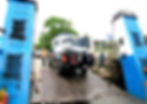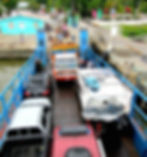Nica Life: Granada to Isla Ometepe
- by paula
- Aug 31, 2015
- 7 min read
Like much of Central America, Nicaragua has a complicated history with the U.S. Most of us may remember the Iran Contra affair - the 1986 scandal in which the Reagan administration illegally sold weapons to Iran in order to fund the Nicaraguan soldiers trained by the U.S. to overthrow the Sandinista government under Daniel Ortega. I was in graduate school in the late 90’s, earning a Master’s degree in public policy, and Central America factored prominently in our foreign policy discussions. Major newspapers at the time were embroiled in a controversial story about the CIA’s involvement with Nicaraguan drug dealers, whose drugs the CIA allowed to be smuggled into the U.S. to finance the war and move weapons. Those events greatly shaped my impression of Central America, and certainly of my own country’s destructive involvement in the region. Nicaragua then seemed far away; a war torn country with guerrilla fighters in the jungle, and covert drug running CIA operations. Which at the time was pretty accurate.

1983 photo of the U.S. funded Anti-Sandinista Contra forces on the San Juan River. Photo from an article in The Intercept
Now roughly 20 years later, President Daniel Ortega is once again in power and I am sitting on a beautiful, peaceful Nicaraguan beach as I write this. The only menacing noises in the jungle are from howler monkeys, and we are planning a trip up the Rio San Juan that used to transport the anti-Sandinista contra rebels. While the current Sandinista government isn’t technically a dictatorship, it certainly isn’t a democracy. Speaking out against the government can be dangerous…or worse. But education and health care are free again, and many people are coming back here to invest, mostly in tourism. And unlike its neighbors to the north, Nicaragua is now one of the safest countries in Central America. We see only a fraction of the guns we saw in Guatemala and El Salvador, with few armed guards in the stores. Although warned about police harassment from other Overlanders, we have experienced no interaction with the police at all. The locals here do seem more guarded and much less friendly, though. As we drive through villages we still wave and say hello, but neither greeting is usually returned.

Side of a building in Leon
Back Our to Nica Life:
From León we headed south to Managua to visit a friend, Angel Castillo (he does my hair back in Mill Valley!). His family also left during the war but since home prices are unaffordable in Marin where he lives, he invested in a home here where he can spend time with his extended family. We spent a couple hours with Angel, comparing life in Marin to life in Managua, and then got back on the road to Granada.
Where León birthed the revolution and is now the intellectual heart of the country, Granada is its spruced up, slightly prettier sister. Both are still a bit gritty but Granada has a few great restaurants, and many buildings & houses are freshly painted in pastel colors. Cars and pedestrians still share the cobblestoned streets with horse and ox carts. We stayed at the Los Patios hotel; a former home of a Danish family who left the country when the Danish embassy was closed after the Sandinistas came back into power. The hotel was on a residential street, several blocks away from the touristy zone but close enough to walk to center of town. We hung out in that 2-3 block radius for about a week.



So, this pregnant mare was lying on her side in front of this building when we walked by. She was going to give birth any minute. A local woman said she'll just walk off with the foal when its born. They certainly treat animals differently down here.

Our hotel "home" - Hotel Los Patios


Granada is sweltering in the summer and its best to either stay in the AC or the water during the day, so we booked a paddleboard trip on Lake Nicaragua. We went with LivitWater (thank you Preston for the recommendation!), owned by a couple from San Diego, Scott and Gea, They (coincidently) lived across the street from our hotel. We paddled with them on a trip through Las Isletas, a group of 300 little islands scattered around in the lake off the shores of Granada. Our plan was to paddle to an eco hotel on one of the islands, have lunch, and then paddle back. But seriously strong winds picked up and we had to really dig in (and get on our knees) to make it to the lunch island. I ended up needing a tow from Scott and then got dumped in the lake when a boat sped right by me. When we finally made it to our destination, we were wiped. The afternoon unfolded leisurely into early evening, and we decided to just have a few beers, eat, and take a late boat back to Granada.

Well deserved beer and lunch with Scott and Gea after our SUP tour.

Views of the lake before heading back to Granada on the boat

We went to dinner with them next night as well. We really enjoyed hanging out with Scott and Gea, learning about their life in Nicaragua and their plans for the future. It made our time in Granada so much more enjoyable. Then it was time to get back in the rig.
A Hostel Living Environment:
Only a half hour drive south from Managua is a crater lake called Laguna Apoyo, a nature reserve wedged in between the cities of Managua and Granada. We turned off the main highway and made our way down quiet roads to the lake. With each mile we saw less and less people and more and more trees. Only a handful of hostels and a few private homes dot the coastline. It is one of the cleanest and most serene lakes in Nicaragua. The water is reportedly medicinal, and has thermal vents that keep it a blissful 80+ degrees. It seemed impossible that so much civilization existed just beyond the crater's rim, yet here it was peaceful, quiet and calm.

Lake beach at Laguna Apoyo
We camped at the Hostel Paradiso. Hostel camping is a new phenomenon for us. It is one we sought out of necessity but have actually come to embrace. With a dearth of actual campgrounds in Central America, we have camped mostly on properties that rent out cabins or rooms, including hostels. It's been good for us. We get decent cheap food, cheap booze, camp worthy bathrooms, use of the facilities (like yoga, a pool, and electricity) and this case a beautiful lakeside location. Yet we get to sleep in our own bed with everything we need within arms reach (literally). Having peeked inside some of the actual rooms in these places, I extremely happy to have my own (tiny) digs. But it's also weird. We are, (ahem), a bit older than the typical hostel goer. These travelers are in their twenties. Maybe a few in their late twenties or early thirties. John and I were married by that age, and had only a couple weeks off work each year if we were lucky.
Hostel guests span the spectrum of deeply tan surfer type to stark white just-flew-in-from-Kansas (or the U.K.) type. The latter a bit doughy from too much beer and too little hard work. With time and just enough money, they have leisurely conversations about bus schedules to the next beach town, or colonial city, or even country.

Camped at Hostel Paradiso with fellow overlanders Janice & Gregor (Live.Travel.Play) and Gorms & Elis of Bee-Individual from Germany

Overlander group shot
This place feels like some lakeside retreat that belongs in a coming-of-age movie. I found myself thinking, who are these bright young, carefree things, and why wasn't I ever one of them?

We spent the days lounging around, playing scrabble and swimming in bath-warm water. One afternoon we surveyed the scene in front of us and remarked to one another that we didn't ever remember having this kind of experience when we were their age. We tried to remember vacations in our teens and early twenties but can recall only a few. The summer of my 15th year I went to work, and every summer since has been spent working. Except this one. It was then that we declared this was our Gap Year. Taking a page from the book of our friend Will Walgren, we declared it the year of John and Paula (ok, maybe a little more than a year). We're a little late, but why not? We’re doing the hostel thing our way.

Livin' the hostel life...not so bad.
We hostel camped again on Ometepe island, a beautiful island of twin volcanoes in the middle of Lake Nicaragua, With the massive volcanoes on the horizon, we loaded LoJo onto the ferry for the hour plus ride. The volcanoes are visible from everywhere on the hourglass shaped island, and are a powerful and ever-present feature. Small villages and farms are spread out on both sides of the island with just as many cows, horse and pigs roaming the streets as residents.



Streets of Ometepe
We made our way to Finca Magdalena, a working coffee farm set in a lush tropical hillside that houses travelers in the old bunkhouse. The other aspect of hostel camping is the social side. Being together 24/7, the way we are, a little social interaction isn't a bad thing. At Finca Magdalena we met Derek & Steph from Colorado, and Emma, Rachel & Junior from Canada. Then along came Gregor and Janice, and we had the makings of a social (a.k.a. long) night. Or in our case two. That, and the daily torrential downpours made for some lazy days and not much else.

Keeping up with the hostel dwellers...

Even when they said, "Let's do a human pryamid photo!!!

Rainy days: Computer time, $2 liters of beer and this porch was our life on the farm.

Camping at Finca Magdalena

Driving into the hills on Ometepe
We did take the time to tour an eco lodge/organic farm with its Dutch owner up in the hillside overlooking the lake. The volcanic ash makes the soil extremely fertile and the land yields abundant crops, feeding not just the island but restaurants in Granada as well. In recent years many farms have turned over to sustainable farming practices. We had lunch at Cafe Compestre, sourcing all its organic ingredients from its own farm on the island, and it was delicious.

We spent the rest of the day driving around the island a little more before heading back to the port town where we overnighted in a hotel parking lot. The next morning we loaded back on the ferry with Janice and Gregor to make our way back to the mainland.


On the ferry sandwiched in between Janice & Gregor and another truck full of bulls. We are always on boats with bulls.

Unsettled.
We are all headed to the Pacific coast, and who knows, if all goes well we might try the hostel life there too.